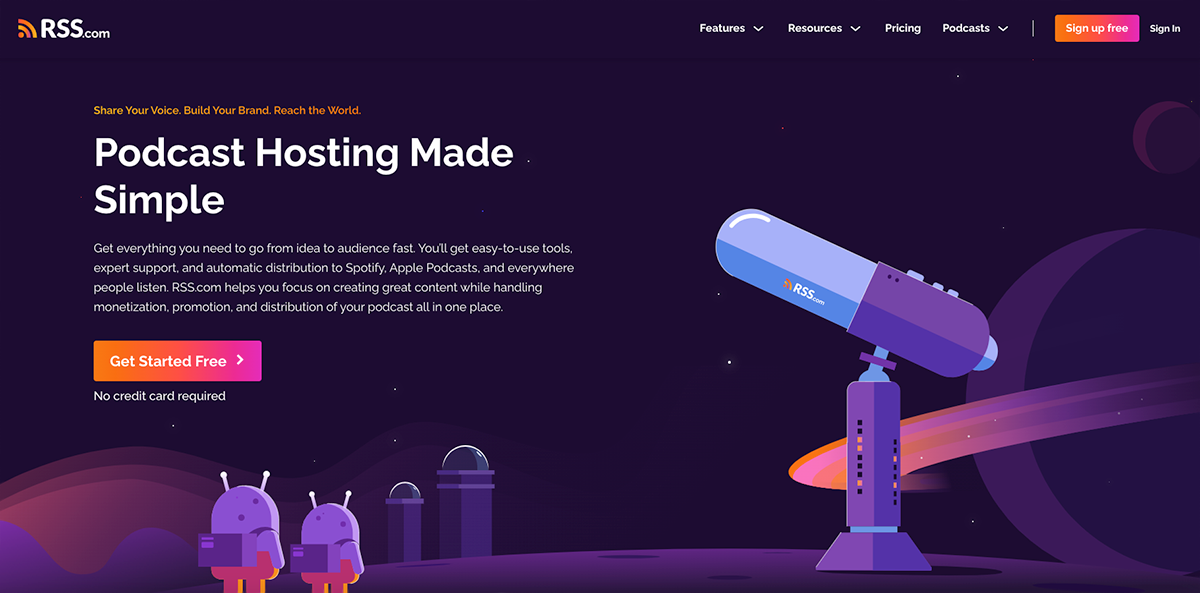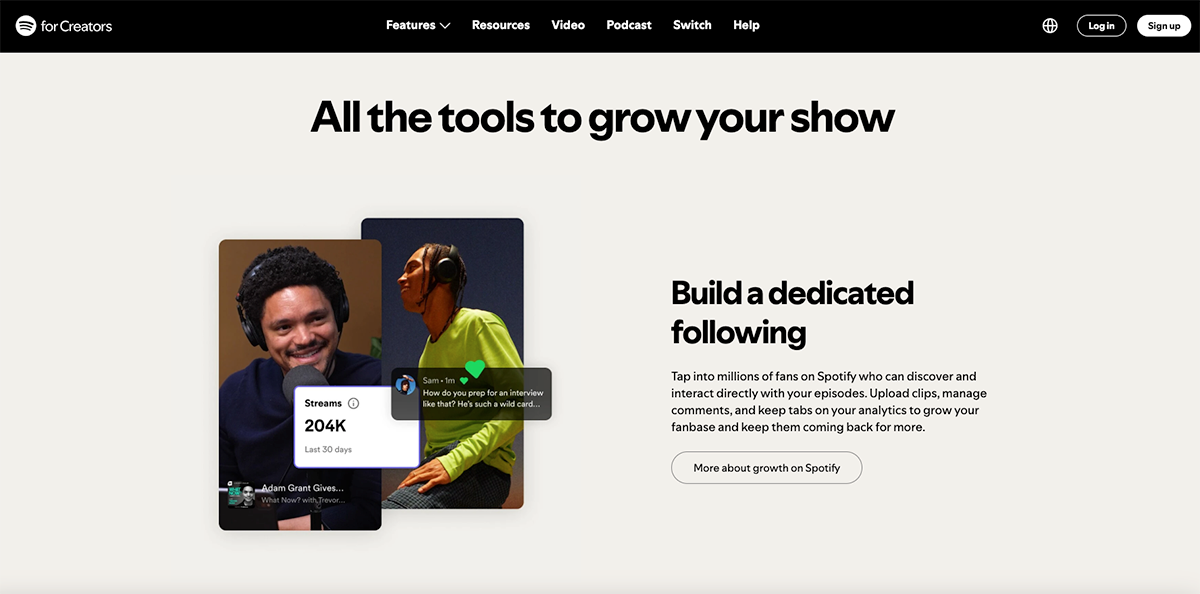Choosing the Best Podcast Hosting Platform in 2025

One of the biggest mistakes new podcasters make when selecting a hosting platform is choosing quantity over quality.
Sure, there are plenty of hosting platforms that offer free plans. However, most of those plans provide users with basic features and a minimum amount of uploads, severely limiting their potential for growth and success.
If you're looking to make your podcast thrive in today's competitive landscape, then choosing a platform with the right features and scalability is essential for any creator looking to stand out within the industry.
Fortunately, we're here to provide you with the right insights to make the decision-making process a bit easier!
In this article, we’ll review 11 top podcast hosting platforms for beginners, each offering a unique set of features, pricing plans, and benefits.
Whether you’re a solo podcaster just starting or a small team looking to launch your podcasting venture, we’ve got you covered!
What is a Podcast Hosting Platform & Why Do Creators Need One?
A podcast hosting platform is a specialized service that stores and delivers podcast episodes to listeners.
Unlike general hosting services, podcast hosting platforms come with tailored tools designed explicitly for podcasters. They ensure seamless episode distribution, reliable storage, and features essential for podcast management.
In addition to providing storage and distribution for podcast episodes, podcast hosting platforms offer a range of features crucial for podcast management and growth.
These platforms typically include tools for episode scheduling, customization of podcast feeds, and integration with various podcast directories to maximize audience reach.
They also offer analytics dashboards, providing creators with valuable insights into listener demographics, engagement metrics, and episode performance.
Furthermore, podcast hosting platforms often offer monetization options, such as ad insertion and listener support features, enabling creators to generate revenue from their content.
Overall, a dedicated podcast hosting platform serves as a vital tool for creators, providing the necessary infrastructure and resources to build, manage, and monetize their podcasts effectively.
Factors to Consider When Choosing a Hosting Service
While many podcast hosting platforms offer basic functionalities, it's important to consider a hosting service that provides a broader range of features. Here are some key factors to go over before choosing a platform:
Pricing
Consider the pricing structure of hosting services, keeping an eye on your budget and the features offered in each plan.
Some platforms may offer tiered pricing based on storage, bandwidth, or additional features.
Consider whether the pricing plans are flexible and scalable, allowing you to upgrade or downgrade as your podcast grows.
Some platforms may also offer discounts or promotions for annual subscriptions, so it's worth exploring all available options before making a decision.
Storage
Evaluate the storage capacity provided by the hosting service to ensure it aligns with your podcast's needs, considering the frequency and length of your episodes.
Additionally, consider the platform's policy on content retention, as some platforms may limit the duration for which they store your episodes, while others offer permanent storage options.
It's also worth examining whether the platform imposes any restrictions on file sizes or formats, as this can impact your ability to upload high-quality audio content.
Analytics
Robust analytics tools are essential for understanding your audience and refining your content.
Look for platforms that offer analytics beyond basic metrics, such as total downloads.
Consider platforms that provide detailed insights into listener behavior, including listener retention rates, geographic distribution, and listening trends over time.
Moreover, integrating with third-party analytics tools or services can also be beneficial, enabling you to correlate podcast performance with other metrics, such as website traffic or social media engagement.
Ease of Use
User-friendly interfaces can significantly impact your podcasting experience.
Opt for a hosting service that offers an intuitive dashboard and straightforward uploading processes.
A user-friendly interface should streamline tasks such as uploading episodes, managing content, and accessing analytics.
Additionally, consider the platform's support resources, including tutorials, guides, and customer support channels.
Sharing Features
Explore the platform's capabilities for sharing your podcast across various channels.
Look for platforms that offer seamless sharing options, allowing you to easily distribute your episodes across popular social media channels such as YouTube, Facebook, and Instagram.
Integration with popular podcast directories, such as Apple Podcasts, Spotify, Google Podcasts, and Stitcher, is also essential for maximizing your show's visibility and reach.
Additionally, you should evaluate whether the platform provides tools or features specifically designed to promote sharing, such as customizable sharing buttons, pre-populated social media posts, or built-in distribution to podcast directories.
11 Best Podcast Hosting Platforms
1. RSS.com

RSS.com makes podcasting feel way less intimidating and a lot more exciting.
Instead of nickel-and-diming creators for features they actually need, it gives you unlimited everything (episodes, downloads, and storage), right out of the gate.
The platform is designed to be as simple as possible, so you’re not stuck wrestling with tech when you’d rather be recording or growing your audience.
Monetization is built in too, with flexible options like ads, sponsorships, Apple Subscriptions, and even Value-4-Value, so shows of any size can start earning.
Publishing is effortless with one-click distribution to every major platform, from Spotify to Apple Podcasts, so your voice goes where listeners already are.
But what really stands out are the extras: AI-powered transcripts in 14 languages, audio-to-video tools for YouTube, and IAB-certified analytics to help you track your growth with real, reliable data.
Even podcasters running multiple shows get support through network hosting and Podcasting 2.0 features that future-proof their content.
And at just $11.99/month after a free trial, RSS.com feels less like a typical hosting service and more like a creative partner built to scale with you.
2. Buzzsprout

Buzzsprout is a beginner-friendly podcast hosting platform that makes it easy for creators to launch and grow their shows without a steep learning curve.
With a free plan available, new podcasters can test the waters and start publishing episodes without upfront costs.
However, it’s worth noting that the plan is limited to 2 hours of content per month and only keeps episodes live for 90 days.
For those ready to scale, Buzzsprout offers affordable hosting options ranging from $12 to $24 per month, giving creators access to more robust tools and long-term hosting.
Paid plans unlock features such as unlimited storage, up to 250GB of bandwidth per month (around 40,000 downloads), and advanced analytics for deeper insights into listener behavior.
The platform also includes automatic episode optimization, ensuring podcasts are formatted for the best possible listening experience and discoverability across platforms.
3. Podbean

Another podcast hosting platform that has cemented its presence in the industry over the last few years is PodBean, and its popularity is well-deserved.
PodBean's versatility and appeal stem from its commitment to catering to podcasters of all levels, offering a plan tailored to every need, from novice to professional.
Its free podcast hosting plan is particularly noteworthy, providing a generous allocation of 5 hours of content per month and 100GB of bandwidth, along with basic analytics and a PodBean-hosted website dedicated solely to your podcast.
For those ready to expand beyond the free plan, PodBean offers various affordable hosting plans starting at $9 a month, ensuring there's an option to suit every budget and requirement.
With unlimited storage and bandwidth, embeddable players, automatic social sharing capabilities (including YouTube uploads), impressive monetization features, and a dedicated iOS and Android app, PodBean equips creators with the tools they need to succeed.
Additionally, its website builder and themes enable podcasters to effortlessly create a professional online presence.
For podcasters just starting out in the industry, Podbean stands as an excellent option for hosting platforms.
4. Libsyn

Libsyn (Liberated Syndication) is a veteran in the podcast hosting landscape, revered for its longevity, reliability, and expansive suite of features tailored to the needs of podcasters.
With a history dating back to the early days of podcasting, the platform has solidified its reputation as a trusted partner for creators seeking a robust and dependable hosting solution.
One of Libsyn's standout features is its affordability, with plans starting at just $5.00 per month (a price point that positions it as a strong contender among the top podcast hosting platforms available).
This competitive pricing makes Libsyn an attractive option for creators seeking a cost-effective solution that doesn't compromise on quality or functionality.
Libsyn's feature set is comprehensive, encompassing unlimited bandwidth, support for both video and audio podcasting, episode scheduling capabilities, and an HTML5 media player for seamless playback across devices.
Additionally, creators have the option to enhance their podcasting experience with a customizable mobile app, available as an add-on for an additional $10 per month.
However, it's important to note that Libsyn's storage capabilities are limited, which may require creators to manage their content strategically to avoid exceeding storage limits.
Additionally, while the platform offers a range of add-ons to enhance functionality, these extras come at an additional cost and can potentially inflate the overall hosting expenses.
5. SoundCloud

While it's widely recognized for its music streaming service, SoundCloud has also emerged as a formidable platform for podcast hosting.
It offers creators an avenue to distribute their shows to a vast audience and potentially gain exposure to SoundCloud's extensive user base.
SoundCloud's transition into the podcasting realm has been accompanied by a robust set of features tailored to meet the needs of creators seeking to share their content with the world.
Despite its primary association with music, SoundCloud's podcast hosting capabilities have garnered attention for their accessibility and effectiveness in reaching audiences across various genres and interests.
The platform's free plan allows creators to upload up to 3 hours of content per month and includes basic reporting tools to track audience engagement.
For those seeking expanded functionality, SoundCloud offers Pro and Unlimited Pro plans at affordable monthly rates of $6 and $12, respectively. These plans unlock a suite of advanced features designed to enhance content production and promotion.
The Unlimited Pro plan includes features such as unlimited upload time, scheduled releases for strategic content rollout, advanced analytics for actionable insights into audience behavior, and customizable embed controls to seamlessly integrate podcasts across websites and platforms.
6. Blubrry

Blubrry is a veteran podcast hosting platform that caters to podcasters who have been in the industry for some time.
While initially perceived as somewhat complex, Blubrry has undergone iterations to enhance user-friendliness. The platform offers a range of pricing plans, starting at $12 per month and ranging up to $100, catering to diverse needs and budgets.
A standout feature is its unlimited bandwidth, available across all plans, which is a significant advantage for podcasts with high listenership.
However, this benefit is offset by the platform's limited storage options, which start at just 100MB per month on the smallest plan.
In addition, Blubrry provides comprehensive listener analytics, which gives users valuable insights into their audience engagement.
For an additional $5 per month, users can access advanced statistics, including full downloads, plays, and partials.
Moreover, Blubrry offers private podcasting capabilities suitable for brands creating internal content, along with the PowerPress plugin, which facilitates the creation of customizable WordPress webpages.
Other noteworthy features include ID3 tagging for embedding artwork and titles, as well as a Pro Production Service that offers audio mastering to enhance sound quality.
Overall, Blubrry's array of features and pricing options makes it a compelling choice for experienced podcasters seeking advanced tools and services.
7. Simplecast

Simplecast streamlines the podcast creation and management process with its user-friendly interface and intuitive tools, making it an excellent choice, especially for podcasts led by multiple members.
The platform ensures the seamless distribution of podcast episodes across popular applications, such as Spotify, Deezer, and Google Podcasts, with just a click.
Starting at $15 a month, Simplecast offers a range of features, including unlimited storage and bandwidth, support for multiple platform distribution, customizable mini websites for podcasts, and robust analytics tools.
Additionally, the Recast™ tool allows users to schedule and share clips of their podcast on social media, enhancing visibility and engagement.
The platform also provides an intelligent web player and a customizable podcast website with branded domains, offering creators various options to enhance their online presence.
While Simplecast lacks directly built-in revenue-generation features, creators can still monetize their podcasts through self-managed sponsorships.
With its advanced features and customizable options, Simplecast empowers podcasters to create engaging content and effectively reach a wider audience.
8. Castos

Castos stands out as a beloved choice among industry creators. Whether you're just starting your podcasting venture or looking to take your content seriously, Castos offers everything you need to grow and achieve your goals.
As a premium-tier hosting platform, Castos offers a range of features with its Essentials Plan, starting at $19 per month.
These features include unlimited podcasts and bandwidth, episode transcriptions, customizable websites and domains, in-depth listener analytics, and a 1:1 onboarding call with their support team.
It also has a WordPress plugin for embedding episode players and private podcasting options.
In addition to the platform’s comprehensive tools, Castos also stands out in its support for monetization. The platform enables you to directly collect donations from your listeners without taking a percentage of your revenue.
In addition to distributing episodes across various apps, Castos excels at extracting data from these platforms, aiding in a more thorough analysis of your podcast's performance.
Though it's one of the most costly hosting platforms, the features and support provided by Castos make it a worthwhile investment for serious podcasters looking to maximize their potential for success.
9. Spreaker

Spreaker offers a comprehensive platform for both novice and seasoned podcasters, providing a range of plans and features tailored to meet diverse needs in the audio medium.
With Spreaker, users can effortlessly create, host, distribute, and monetize their podcasts all in one centralized platform.
Whether you're just embarking on your podcasting journey or a seasoned pro looking to expand your reach, Spreaker's intuitive interface and robust tools streamline the entire podcasting process.
Starting from a free tier and scaling up to $250 per month for premium plans, Spreaker offers a flexible pricing structure to accommodate various budget levels and podcasting requirements.
Key features include live stream recordings with an interactive chatbox for real-time listener engagement and comprehensive listener analytics that provide insights into listening sources, devices, and geographic locations.
The platform also facilitates ad revenue sharing and offers an Ad Exchange feature, allowing users to choose the placement of ads with automatic fill-in by ad partners.
Additionally, Spreaker's Supporters Club feature empowers creators by enabling listeners to activate monthly paid subscriptions to support their favorite series, fostering a closer connection between creators and their audience.
10. Spotify for Creators

Spotify for Creators (formerly Anchor) has become one of the most accessible free podcast hosting platforms on the market, offering new and seasoned podcasters the tools to publish, grow, and monetize their content without incurring monthly fees.
With unlimited audio and video hosting, free distribution across all major podcast apps, and a mobile app for iOS and Android, it’s designed to help creators focus on their content while reaching Spotify’s 500+ million users.
Creators can record episodes directly in their browser through Spotify’s Riverside integration, upload polished audio or video files, and instantly publish them to Spotify and beyond.
Engagement tools, such as Q&As, polls, and listener comments, make it easy to build a community and encourage fans to interact with your episodes.
Podcasters also gain access to a detailed analytics dashboard, which provides insights into demographics, listening behavior, drop-off points, and impressions, enabling creators to fine-tune their content.
On the monetization side, Spotify for Creators offers multiple revenue streams through the Spotify Partner Program, including dynamic ad insertion, premium content subscriptions, listener support (donations), and premium video ad revenue in select markets.
While Spotify does take a 50/50 ad revenue split compared to the 70%+ kept on platforms like Libsyn, Simplecast, or Castos, the benefit is that these tools are completely free to access, making it one of the easiest ways to monetize your podcast from day one.
11. Transistor

Since 2018, Transistor has rapidly grown to serve thousands of podcasts across a diverse range of genres, catering to indie podcasters, small businesses, and enterprise companies alike.
While the platform doesn’t offer free plans, it does provide a 14-day free trial, allowing users to explore its capabilities and determine its suitability for their needs before committing to a subscription that starts at $19 a month.
Transistor's feature-rich offerings include a custom embeddable podcast player, empowering creators to seamlessly integrate playlists, recent episodes, or specific backlog episodes into their existing websites with personalized branding.
Hosting features, including unlimited podcasts, multi-user access with customizable permissions, and advanced analytics, enable users to efficiently manage and analyze their podcasting endeavors.
Moreover, Transistor simplifies content distribution with its YouTube auto-posting feature, which automatically converts audio files into video format and uploads them to YouTube, complete with customizable background images.
The platform also provides a user-friendly podcast website builder, equipping creators with essential pages such as the homepage, episode landing pages, an "About" section, and a subscription page, all designed to enhance the podcasting experience.
With robust integrations with leading platforms such as Riverside.fm, MailChimp, HubSpot, and Drip, along with private podcast hosting capabilities tailored for internal communications, Transistor emerges as a comprehensive solution for podcasters seeking reliability, flexibility, and scalability in their podcast hosting endeavors.
Join the Creator's Playground: Fourthwall Awaits
A reliable podcast hosting service lays the foundation for your podcast's success, impacting its reach, analytics, and overall management.
In this ever-evolving digital landscape, Fourthwall emerges as the ultimate solution for content creators across diverse domains.
Fourthwall serves as a creative haven, offering an entire ecosystem to nurture and showcase your podcasting endeavors.
Whether you're launching a website, sourcing and selling products, or offering memberships to your followers, Fourthwall streamlines the process, empowering you to focus on creating compelling content.
Explore Fourthwall today and unlock enhanced possibilities for your digital journey!
FAQs
Where can I host podcasts for free?
There are several free podcast hosting options out there, including Spotify for Podcasters, Podbean, Spreaker, and SoundCloud.
These platforms typically offer a free plan with limited storage, bandwidth, or analytics, which can be suitable if you’re just starting to create podcasts.
However, most podcasters eventually upgrade to paid plans from services like RSS.com, Libsyn, or Simplecast to unlock advanced tools, unlimited uploads, and better growth opportunities.
Can I monetize a podcast?
Yes, you can absolutely monetize a podcast, and there are multiple ways to do it.
Popular methods include running ads, partnering with sponsors, offering premium content through subscriptions, or using listener-supported models like Value-4-Value.
Hosting platforms like RSS.com, Podbean, or Castos make it easy for podcasters to access built-in monetization tools that help turn a growing base of listeners into a sustainable income.
What is the most used podcast platform?
The best podcast platform for listeners often depends on location and preferences, but Apple Podcasts and Spotify consistently dominate globally.
Other widely used options include Google Podcasts, Stitcher, and niche platforms like Pocket Casts.
As a podcaster, it’s crucial to distribute your show across multiple platforms so you can maximize reach and ensure your content is available wherever your audience listens.
Is RSS.com free?
RSS.com offers a free plan for new podcasters to test out the platform for 30 days with no credit card required.
After the trial, you can continue using all its features, including unlimited episodes, transcripts, and one-click distribution, for as little as $11.99/month.
Compared to other providers like Libsyn or Castos, RSS.com keeps pricing simple while delivering professional-grade tools that help you grow and monetize your show.
Is Spotify a good podcast hosting platform?
While Spotify is one of the most popular places for listeners to discover and stream shows, it’s not really built for dedicated hosting.
Instead, it works best as a distribution channel, where podcasters can upload their episodes through platforms like RSS.com, Simplecast, or Podbean and then push them to Spotify.
For features like transcription, advanced analytics, and reliable bandwidth for large audiences, a specialized podcast hosting service is the better choice.
















